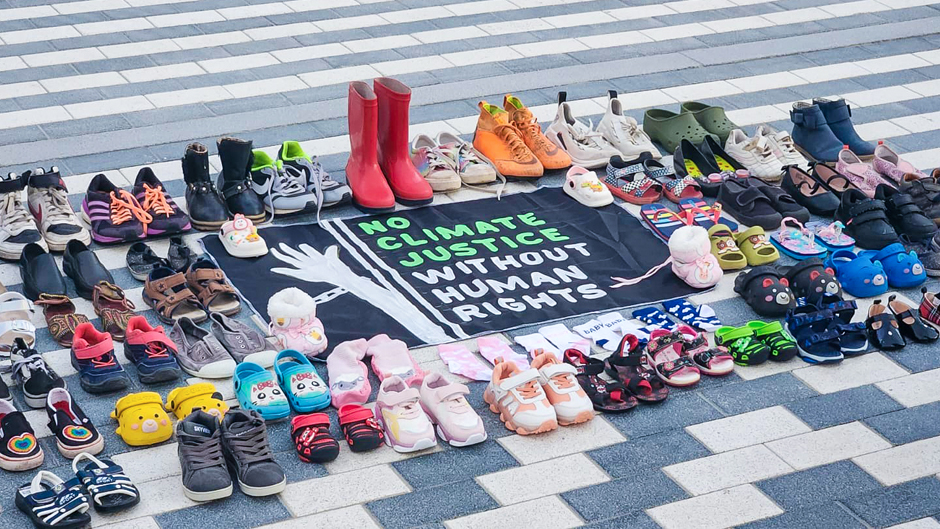The annual United Nations Climate Change Conference is underway in Dubai, with more than 70,000 participants—including heads of state, business leaders, climate scientists, Indigenous people, and others—coming together to find common ground in accelerating the transition away from planet-warming fossil fuels.
This year's summit, known as COP28, is embroiled in controversy. It is held in the United Arab Emirates, the world's fifth-largest oil producer. The conference's president is Sultan Ahmed al-Jaber, who heads Abu Dhabi's national oil company.
The talks also come as 2023 is expected to be the planet's warmest year on record, leading many climatologists to warn that time is running out on preventing the Earth from reaching a tipping point.
A University of Miami delegation of students and faculty members is in the UAE for the historic conference, attending talks, participating in panels, and presenting their climate-related research and clinical work. Keep abreast of their activities as they file regular dispatches from Dubai, giving readers a behind-the-scenes look at the two-week summit.
Dispatch by second year environmental law student Alyssa Huffman.
December 4, 2023: Nature-based solutions to sea level rise
Today, my colleagues and I gave a presentation on nature-based solutions to sea level rise at the Panama Pavilion at COP28. I specifically focused on stormwater resilience and the potential for green infrastructure to alleviate pressure on existing stormwater infrastructure as sea level rise exacerbates flooding in Miami. My discussion stemmed from my work as a legal intern with the University of Miami School of Law's Environmental Justice Clinic. The clinic focuses on local environmental justice advocacy throughout Miami and is made up of teams that address various issues such as housing justice, food justice, heat, and stormwater.
I am part of the stormwater team. We tackle the issue of stormwater pollution in Miami with a coalition consisting of the Environmental Justice Clinic, Miami Waterkeeper, Everglades Law Center, and PEER Group. The coalition aims to ensure compliance with federal regulatory stormwater permitting requirements by educating officials about requirements, engaging communities in governance, and, when necessary, litigating against those not in compliance.
The movement toward green infrastructure is an important prong in the fight against stormwater pollution. It provides communities with enhanced resilience as we adapt to our changing climate. We must ensure that green infrastructure is implemented in an equitable manner that considers the voices and thoughts of the communities most impacted by stormwater. As such, my talk at the Panama Pavilion focused on how we can ensure a just stormwater infrastructure transition. I also highlighted some of the accomplishments of the Environmental Justice Clinic.
December 3: COP28 leads to historic local partnerships
Michael Berkowitz, executive director of the University of Miami's Climate Resilience Academy, is not attending COP28 solely for the negotiations. He also is focused on the connections he can make while attending outside networking events and panels. Indeed, COP provides a unique opportunity for climate leaders from across the world to convene and connect on a common goal. Michael invited me to attend a reception for the creation of a historic partnership: The Mediterranean Climate Action Partnership.
This initiative, headed by governments in Catalonia and California, brings together 14 local governments from several continents that share similar climates to collaborate on local climate resilience efforts.
Deanne Criswell, the 12th administrator of the Federal Emergency Management Agency, spoke about the importance of local and subnational efforts in fighting climate change. So, while international negotiations continue at Expo City, local governments also are making waves throughout Dubai.
December 1, 2023: Human rights and climate justice underscore COP28 climate negotiations
On the same day that a historic agreement was reached on the Global Loss and Damage Fund, a different kind of event was happening, mere buildings away from where the historic pledge was crafted. I stood amongst a large crowd, listening to Indigenous speakers call for a phase-out of fossil fuels and a spot at the table for the Global South's voice to be heard.
The purpose of the COP is not only to negotiate agreements under the UNFCCC (United Nations Framework Convention on Climate Change); in fact, that's only a small portion of the vast number of events going on throughout this conference. This year, Indigenous and underrepresented groups are making their voices heard by hosting pavilions, staging climate-related art exhibitions, and weighing in on the ongoing negotiations. More than ever, there is a recognition that human rights and equity are needed to reach climate justice.
Related stories:
Students and faculty at U.N. climate talks
What I am watching for at COP28

